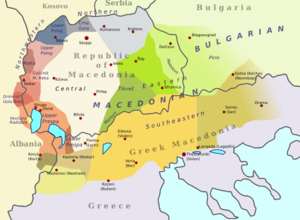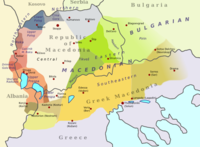| Revision as of 22:53, 12 November 2015 editGood Olfactory (talk | contribs)688,950 edits +Category:Bitola Municipality; +Category:Prilep Municipality; +Category:Kruševo Municipality; +Category:Demir Hisar Municipality using HotCat← Previous edit | Revision as of 15:34, 1 September 2016 edit undoBjankuloski06 (talk | contribs)Extended confirmed users1,401 edits audio of the dialectNext edit → | ||
| Line 1: | Line 1: | ||
| ] | ] | ||
| {{Listen | |||
| | header = Дијалектни примери | |||
| | filename = Prilep-Bitola dialect speech - Topolčani.ogg | |||
| | title = Peter's Mourning | |||
| | description = Folk epic told by a resident of ], ] region | |||
| | filename2 = Prilep-Bitola dialect speech - Bitola.ogg | |||
| | title2 = The Pebble Stew | |||
| | description2 = Tale told by a woman from the city of ] | |||
| }} | |||
| The '''Prilep-Bitola dialect''' ({{lang-mk|Прилепско-битолски дијалект}}, ''Prilepsko-bitolski dijalekt'') is a member of the central subgroup of the western group of ] of the ]. This dialect is spoken in much of the ] (more specifically, the ], ], ] and ]), as well as by the ] population in and around ] (Lerin)<ref>'''author missing'''. Леринскиот говор. Македонски jазик, 1983, ХХХIV, стр. 23-49.</ref><ref>Hill, Peter. The Dialect of Gorno Kalenik 1991, Columbus, OH</ref> in neighbouring ]. The Prilep-Bitola dialect, along with other peripheral west-central dialects, provides much of the basis for modern ].<ref>Makedonska gramatika by Krume Kepeski | The '''Prilep-Bitola dialect''' ({{lang-mk|Прилепско-битолски дијалект}}, ''Prilepsko-bitolski dijalekt'') is a member of the central subgroup of the western group of ] of the ]. This dialect is spoken in much of the ] (more specifically, the ], ], ] and ]), as well as by the ] population in and around ] (Lerin)<ref>'''author missing'''. Леринскиот говор. Македонски jазик, 1983, ХХХIV, стр. 23-49.</ref><ref>Hill, Peter. The Dialect of Gorno Kalenik 1991, Columbus, OH</ref> in neighbouring ]. The Prilep-Bitola dialect, along with other peripheral west-central dialects, provides much of the basis for modern ].<ref>Makedonska gramatika by Krume Kepeski | ||
| Language, Vol. 27, No. 2 (Apr–Jun, 1951), pp. 180–187</ref> ] dialects have developed in the cities of ] and ]. | Language, Vol. 27, No. 2 (Apr–Jun, 1951), pp. 180–187</ref> ] dialects have developed in the cities of ] and ]. | ||
Revision as of 15:34, 1 September 2016


The Pebble Stew Tale told by a woman from the city of Bitola
Problems playing these files? See media help.
The Prilep-Bitola dialect (Template:Lang-mk, Prilepsko-bitolski dijalekt) is a member of the central subgroup of the western group of dialects of the Macedonian language. This dialect is spoken in much of the Pelagonia region (more specifically, the Bitola, Prilep, Kruševo and Demir Hisar municipalities), as well as by the Macedonian-speaking minority population in and around Florina (Lerin) in neighbouring Greek Macedonia. The Prilep-Bitola dialect, along with other peripheral west-central dialects, provides much of the basis for modern Standard Macedonian. Prestige dialects have developed in the cities of Bitola and Prilep.
Phonological characteristics
The phonological characteristics of the Bitola-Prilep dialect which can also be found in the other peripheral dialects are:
- mostly antepenultimate word stress (see Macedonian phonology);
- Proto-Slavic *ǫ has reflexed into /a/:
- rǫka > рака /ˈraka/ ('hand')
- except for the Prilep sub-dialects, Bitola sub-dialects have two phonemic lateral consonants (/ɫ/ and /l/, continuants of Proto-Slavic *l and *ĺ):
- ex. Proto-Slavic *kĺučь > in Bitola sub-dialects, in Prilep sub-dialects
- while most Macedonian dialects have a phonemic /f/ (in loanwords), many sub-dialects of the Prilep-Bitola dialect—with the exception of urban prestige dialects—instead have /v/:
- Megleno-Romanian fustan /ˈfustan/ > вустан /ˈvustan/ ('ladies' dress')
- Ottoman Turkish فوطة /ˈfuta/ > вута /ˈvuta/ ('apron')
- Ottoman Turkish فرنا /ˈfuɾna/ > вурна /ˈvurna/ ('bakehouse, masonry oven')
- the palatal affricates are typically prepalatalized: свеќа /ˈsvɛca/ ('candle') is realized as , меѓа /ˈmɛɟa/ ('border, frontier') is realized as ;
- a similar features occurs with the palatal nasal: јадење /ˈjadɛɲɛ/ ('food') is realized as ;
- the etymological /v/ in initial position has been lost in a number of instances:
- in the sequences *vs- and *vz-, as is the case in the standard; e.g. сè /sɛ/ ('all') from the earlier *все, зема /ˈzɛma/ ('to take') from the earlier *взема;
- in a handful of words where the pronunciation was "evened up" with that of their antonyms: натре /ˈnatrɛ/ from the earlier внатре /ˈvnatrɛ/ ('inside') as per надвор /ˈnadvɔr/ ('outside'), ногу /ˈnɔɡu/ from the earlier многу /ˈmnɔɡu/ ('much, a lot') as per малку /ˈmalku/ ('a little');
- intervocalic consonant elision is typical of this dialect, and elided forms are in free variation with non-elided forms:
- elision of the intervocalic /v/:
- in the plural forms of monosyllabic nouns, e.g. лебо(в)и:
- elision of the intervocalic /v/:
- /ˈlɛbɔvi/ → /ˈlɛbɔi/ (realized as ~ )
- and in most other positions, e.g. то(в)ар:
- /ˈtɔvar/ → /ˈtɔar/ (realized as )
- certain short words (conjunctions, pronouns, determiners, etc.) have undergone further elision, ex.:
- /ˈsɛga/ (→ /ˈsɛa/) → ('now')
- */ˈtɔva/ (→ /ˈtɔa/) → (indic. pron. 'that')
- /ˈkɔga/ (→ /ˈkɔa/) → (interr. pron. 'when')
- insertion of /t/ and /d/ into consonant clusters -/sr/- and -/zr/-, respectively; for example, /stram/ from the earlier /sram/ (срам, 'shame') and /zdrɛl/ from the earlier /zrɛl/ (зрел, 'ripe').
- In the sub-dialect of Bukovo-Orehovo, especially among the oldest generations:
- while is an allophone of /l/ in most dialects (occurring in all positions except before front vowels and /j/), in this dialect is used instead; ex.:
- for (глава, 'head') and for (слама, 'straw')
- чаша /ˈt͡ʃaʃa/ ('cup') is realized as
- жаба /ˈʒaba/ ('frog') is realized as
- the Proto-Slavic syllabic *l̥ has reflexed into /ə/, e.g. *sъlnьce > /ˈsənt͡sɛ/ ('sun'), *vьlkъ > /vək/ ('wolf').
Morphological characteristics
- tripartite definite article pertaining to the position of the object (see Macedonian grammar);
- merger of thematic е-group verbs to и-group verbs; e.g. јаде /ˈjade/ → јади /ˈjadi/ (3P sg. PRS of 'to eat');
- the third-person personal pronouns: тој, та/таа/таја, то, тие/тија (he, she, it, they);
- some of the outermost dialects of the Lerin subdialect have он, она, то, они;
- imperfective verbs are typically derived from perfective verbs by means of the suffix –ва (e.g. зборва and боледва);
- 'expansion' where other dialects have palatalization: падина ("to fall", sing. present third-person) versus the standard паѓа;
- use of the oblique form for proper names;
- no distinction between masculine and feminine short possessive pronouns, i.e. consistent use of му and го for both genders and also the plural third person.
Typical Words
- Чупе (/ˈt͡ʃupɛ/) – 'girl'
- Преѓе (/ˈprɛɟɛ/), преѓеска (/ˈprɛɟɛska/) – 'recently, lately'
- Модистра (/ˈmɔdistra/) – 'seamstress'
- Бендиса (/ˈbɛndisa/) – 'to have a liking for something or someone', 'to fancy'
- Сурат (/ˈsurat/) – 'face'
- Плусне (/ˈplusnɛ/) – 'to fire (a rifle)'
- Капнат (/ˈkapnat/) – 'exhausted'
- Греда (/ˈgrɛda/) – 'plank', 'beam (of wood)'
Notes
- author missing. Леринскиот говор. Македонски jазик, 1983, ХХХIV, стр. 23-49.
- Hill, Peter. The Dialect of Gorno Kalenik 1991, Columbus, OH
- Makedonska gramatika by Krume Kepeski Language, Vol. 27, No. 2 (Apr–Jun, 1951), pp. 180–187
- Граматика на македонскиот литературен јазик, Блаже Конески, Култура, Скопје 1967, стр.68
- Историја на македонскиот јазик, Блаже Конески, Култура, Скопје 1986, стр. 21
- Friedman, Victor (1998), Macedonian: Comparative Grammar, Slavic and East European Language Research Center (SEELRC): p. 22
External links
| Dialects of Macedonian | ||||||
|---|---|---|---|---|---|---|
| Western |
|  | ||||
| Northern |
| |||||
| Southeastern |
| |||||
| Also considered a dialect of Bulgarian. Considered to be a part of the transitional Torlak dialect and as a subdialect of Bulgarian, Macedonian, and Serbo-Croatian. | ||||||